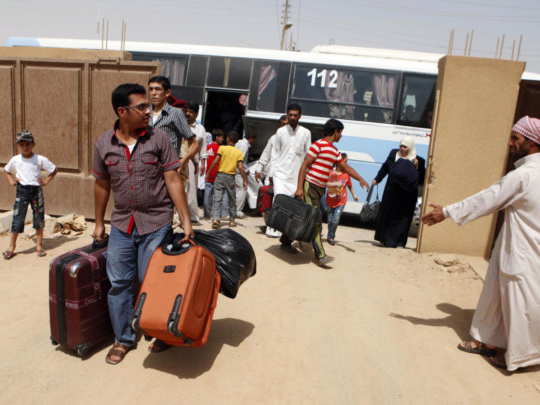
Outside Al Qaim, Iraq: At a bare concrete building on the western edge of Iraq, hundreds of Syrian refugee families wait in the shade, anxious to find out where they will spend the night after fleeing their homeland.
Many of the men, women and children had come from the Syrian town of Albu Kamal and said Syrian rebel forces escorted them on the 7km road to the main border gate with Iraq.
Albu Kamal was captured by rebel forces last week in a push to seize Syria’s international border crossings. Government forces have been trying to wrest back control, firing shells and rockets on the town, they said.
“When we woke up there was shelling. When we went to sleep there was shelling,” 34-year-old Jamil Rafea Al Mahmoud said as he waited for Iraqi border control to process his papers.
“I am very upset at leaving my house, my neighbourhood, my people, but what can I do? The Syrian people, we do not have anywhere to go but this safer place, Iraq,” he said, without a hint of irony.
That Syrians are willing to cross the border despite bomb attacks across Iraq this week shows just how bad the situation back home has become.
Syrian refugees entered the desert border crossing near the western Iraqi town of Al Qaim on pick-up trucks or on Iraqi government buses as part of a convoy.
They clambered down from vehicles into crowds of shouting soldiers and military trucks, and dragged their bags through the dust. Around 500 Syrians were already waiting at a camp for the refugees at the customs building, in an area surrounded by blast walls and coils of barbed wire.
Syria’s 16-month-old uprising has been transformed from an insurgency in remote provinces into a battle for control of the two main cities, Aleppo and Damascus, where fighting broke out last week. President Bashar Al Assad’s forces have counter-attacked.
About 50 Iraqi military trucks carrying troops, tanks and guns hurtled towards Al Qaim on the road from eastern Iraq late on Tuesday to reinforce the border.
“We left Albu Kamal because Bashar’s army slit throats and killed my relatives,” 49-year-old Nassra Abdul Hallim said, seated with a group of veiled women and children.
“We drove behind the Free Army to the border and they opened the road for us,” she said.
Next to her an older woman dressed in black held a limp, pale baby she said was exhausted from the journey.
Attacks every day
Children slept on the floor or on top of piles of luggage as Red Crescent workers handed out watermelons and drinks in the 45C heat. Iraqi authorities were setting up tents nearby for Syrians that have no relatives to stay with.
“The situation is very, very dangerous in Deir Al Zor, there are attacks every single day,” Hussam Mohammad, 34, said, surrounded by his family as children screamed and ran through the crowds of adults.
Syrians in his city, around 140km from the Iraqi border, fear government forces more than the Free Syrian Army (FSA), he said. Across the border the rebels had painted a large mural of the FSA flag on a building.
“The war is between the two sides. They are shooting at each other and the people are just the victims,” Mohammad said.
Fearing a spillover of violence, the Iraqi army sealed the Qaim crossing with concrete blast walls on Friday, trapping Syrians trying to escape attacks on the other side, according to local officials. Iraq’s Prime Minister Nouri Al Maliki overturned the decision on Monday.
Iraq, whose desert province of Anbar, a Sunni heartland, borders Syria, is nervous about the impact of the conflict in its neighbour where mainly Sunni rebels are fighting to end Al Assad’s Alawite-dominated rule.
Al Assad describes his foes as foreign-backed terrorists who are responsible for the killings.
The Iraq’s Shiite-led government said on Monday it rejected Arab League calls for Al Assad to quit, saying it was for the Syrian people alone to decide his fate and others should not interfere.
A 16-year-old boy at the border, who gave his name as Ali, said he had fled his house in Albu Kamal with his father and four younger brothers after it was struck by shelling. They had tried to run to a neighbour’s house.
“When we went outside the shells hit the houses and shrapnel wounded me,” he said, lifting up his football T-shirt to show blood-stained bandages across his stomach.
“The shrapnel hit my father on the head and the children were pushed back by the blasts. I fell on top of my father. He was dead,” Ali said.
His brothers were being treated in Qaim hospital where doctors have received scores of wounded Syrians, according to local officials. The family will stay in tents provided by the Iraqi government for now, his mother Hayem said.
“It was [Al] Assad’s army that shelled our house. [Al] Assad’s groups killed my husband,” she said.












